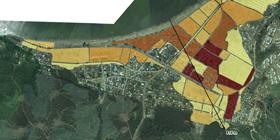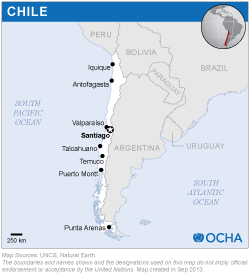David Stevens, UN-SPIDER
The mission included meetings with the Ministry of Foreign Affairs, the Ministry of National Assets, the National System for the Coordination of Territorial Information, the National Office for Emergency of the Ministry of the Interior (ONEMI), the Space Commission of Chile, and other government agencies. The mission also included a field visit to the regions of Talca and Constitucion, which were heavily impacted by both the earthquake and the tsunami.
In addition, the mission included follow-up meetings in Washington D.C. with representatives of the World Bank, and with government agencies of the United States (Department of State, US Agency for International Aid (USAID), US Foreign Disaster Assistance (USOFDA) and NASA), as well as with representatives from Thermopylae Sciences and Technology, a consulting company providing support to US Southern Command.
- ONEMI has a long tradition in the context of emergency response. But in the case of the earthquake, it experienced a breakdown in telecommunications that inhibited the coordination of emergency response activities during several hours after the earthquake.
- The Government of Chile and ONEMI are well aware of the benefits of space-based information in the context of emergency response, and have requested the activation of the Charter and of UN-SPIDER in such cases.
- While ONEMI had received training from the National Commission on Space Activities of Argentina (CONAE) on the processing of satellite imagery for emergency response, the amount of satellite imagery provided to ONEMI demanded support from other government agencies and universities for its processing.
- In its coordinating role, ONEMI has the capacity to mobilize the support of other government agencies and academia in case of disasters.
ONEMI and the other agencies could greatly benefit from processing the satellite imagery provided by a variety of space agencies to elaborate a mosaic map of satellite imagery donated as a way to identify which geographic areas are covered and where there are gaps that need to be filled.
To better present information to decision makers in case of emergency response, geo-viewers, such as the one developed by Esri, could be very useful to display information regarding the impacts of the event and additional layers. The use of these tools should be explored by ONEMI.
The Government of Chile is recommended to continue its efforts towards the establishment of the Chilean Space Agency as a way to promote the use of space-based applications in a variety of areas, including disaster-risk management and emergency response.
ONEMI and other agencies could systematize lessons learned from the use of space-based information in the case of the 2010 earthquake and explore the use of other space-based technologies in case of emergency response including satellite telecommunications and GNSS.


